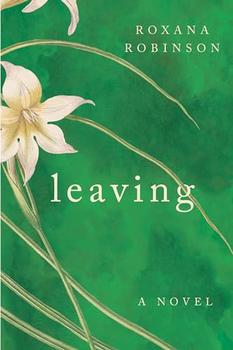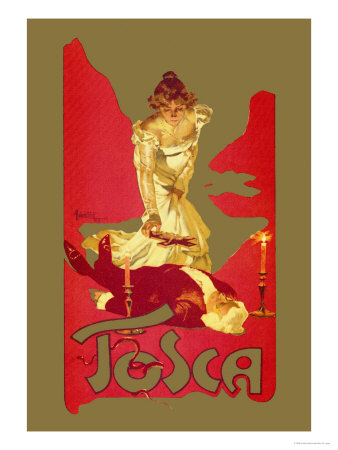Summary | Excerpt | Reading Guide | Reviews | Beyond the Book | Read-Alikes | Genres & Themes | Author Bio

A Novel
by Roxana RobinsonThis article relates to Leaving
 Roxana Robinson's novel Leaving begins with the protagonists meeting at the Metropolitan Opera House during a production of Tosca. This opera is a tragedy, set in Rome in 1800, during the Napoleonic Wars.
Roxana Robinson's novel Leaving begins with the protagonists meeting at the Metropolitan Opera House during a production of Tosca. This opera is a tragedy, set in Rome in 1800, during the Napoleonic Wars.
The drama centers around three main characters: Mario Cavaradossi, a painter and Napoleon supporter; Baron Vitellio Scarpia, the corrupt head of police; and Floria Tosca, a beautiful opera singer. Tosca and Cavaradossi are lovers but the lascivious Scarpia wants to add Tosca to his long list of conquests. He arrests Cavaradossi on suspicion of hiding an escaped political prisoner and has him tortured in Tosca's hearing, ultimately sentencing him to death. Tosca pleads for Cavaradossi's life, which Scarpia pretends he'll grant in exchange for her willingly giving herself to him. He writes a letter of safe passage for the couple and tells her he's arranged for the execution to be faked. As he then goes to embrace Tosca, she stabs him in the heart, uttering one of the most famous lines in all of opera: "Questo è il bacio di Tosca!" ("This is Tosca's kiss!"). She takes the letter to where her lover awaits execution, still believing his death will be staged. A firing squad shoots Cavaradossi and leaves, and when Tosca tells him to get up and flee with her, she discovers he really is dead and she's been fooled. Alarm bells start to ring and guards, having discovered Scarpia's body, attempt to arrest her. She jumps off the parapet of the castle, shouting, "O Scarpia, avanti a Dio!" ("O Scarpia, we meet before God!"). In short, as in all good operatic tragedies, everyone dies in the end.
Tosca's composer, Giacomo Puccini (1858-1924), was one of the most successful of his day, and his works remain extremely popular among opera lovers even now. He's responsible for well-known masterpieces such as Madama Butterfly, Turandot and La bohème; Tosca was his fifth (out of a total of 12).
Tosca was based on a play by Frenchman Victorien Sardou — La Tosca — which premiered in 1887 in Paris, starring the famous actress Sarah Bernhardt in the title role. It was immediately successful and ran for over 3,000 performances in France alone. Puccini saw it in Turin and Milan and contacted the play's publisher in 1889 to obtain permission to turn it into an opera. He was initially turned down, but eventually the playwright relented after much drama (Sardou, for example, demanded final approval over the libretto).
Tosca premiered in Rome at the Teatro Constanzi on January 14, 1900. Although it wasn't a critical success (critics deemed it too melodramatic and objected to its themes of violence, sexual abuse, torture and police corruption), audiences loved it from the start. Performed in three acts, its most famous aria is "Vissi d'arte" ("I lived for art"), sung by Tosca in the second act as she contemplates her current situation. (Interestingly, this aria was a last-minute add to appease the starring soprano, who complained she didn't have any challenging numbers.)
Some say Tosca is cursed, and indeed, there are many stories of mishaps occurring during performances — wigs catching fire, electric candles lighting in the wrong order, curtains coming down too soon, etc. Many of the most interesting mishaps seem to have occurred during the opera's final scene, when Tosca jumps off the parapet to her death. In 1993, Elizabeth Knighton Printy broke both legs. There's also a tale about stagehands getting revenge on a particularly demanding diva by replacing the mattress she was supposed to land on with a trampoline. She ended up bouncing back up into view (15 times, it's said) before someone thought to lower the curtain. In another instance, a harried director neglected to fully inform the extras acting as guards about what they should do, telling them to "exit with the principal." After Tosca jumped, the guards proceeded to leap off the parapet, one after the other, taking the instruction a bit too literally.
Tosca first appeared at New York's Metropolitan Opera House on February 4, 1901 in a production directed by William Parry, starring Milka Ternina in the title role, with Giuseppe Cremonini as Cavaradossi and Antonio Scotti as Scarpia. The company has performed the work around 1,000 times in the decades since.
1899 poster by Adolfo Hohenstein for Giacomo Puccini's Tosca, via Wikimedia Commons
Article by Kim Kovacs
Filed under Music and the Arts
![]() This "beyond the book article" relates to Leaving. It originally ran in March 2024 and has been updated for the
March 2025 paperback edition.
Go to magazine.
This "beyond the book article" relates to Leaving. It originally ran in March 2024 and has been updated for the
March 2025 paperback edition.
Go to magazine.
Your guide toexceptional books
BookBrowse seeks out and recommends the best in contemporary fiction and nonfiction—books that not only engage and entertain but also deepen our understanding of ourselves and the world around us.